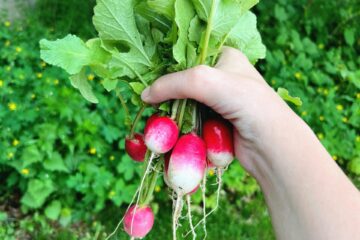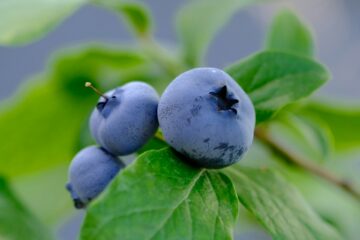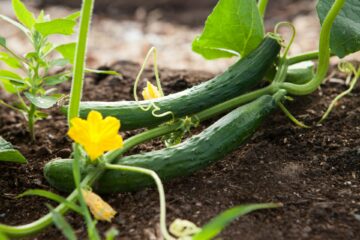Gardening is a wonderful way to spend some time outside and reap the benefits of fresh air and sunshine. If you’re thinking about gardening, you might consider edible gardening. While there are many different types of edibles that can grow successfully in your garden, there’s something special about growing your own herbs, fruits, and vegetables. Having fresh herbs on hand can help add flavour to meals without having to call on store-bought versions at all times—and growing them yourself means you can be sure they’re pesticide-free!
Get the right soil
Soil is the foundation of a healthy garden. If you’re new to growing your own food, it’s important to understand how soil pH affects how plants grow, as well as the nutrients and minerals present in your soil. Soil should be loose, friable and nutrient rich with good drainage–and if you’re lucky enough to have access to compost or manure from local farms (or even just animal droppings), all the better! Organic matter improves drainage by providing air spaces between particles of clay or sand; it also makes nutrients more available for plants’ roots by acting as an anchor for microorganisms that break down organic materials into usable forms.
Choose the right seeds
Choosing the right seeds is the first step to growing your own food.
- Choose seeds that are suited to your soil. If you have sandy soil, look for plants that don’t need much water and will be able to thrive without too much fertilizer or mulch. If you have clay soil, choose plants that can tolerate wetter conditions and still produce tasty fruits and vegetables.
- You can get started with a small space–even on an apartment balcony! Some herbs grow well indoors during winter months when there isn’t enough light outside; other types of vegetables (like tomatoes) will need more space but are still possible if you take care not to overcrowd them in their pots or beds as they grow bigger over time. And if all else fails? Flowers always make great additions!
Figure out your planting area
Before you start planting your garden, consider the following:
- Weather. What’s the climate like where you live? Are there seasons and how long do they last? Will your plants have enough sunshine or will they be shaded by trees or buildings?
- Experience level. Are you a beginner or expert gardener? If this is the first time that you’ve ever planted anything, make sure that whatever seeds or plants are selected are appropriate for beginners so as not to overwhelm yourself with too much information at once.
- Space available in my garden space (how big is it). How much room do I have in which to grow food items such as fruits and vegetables? Is there enough sunlight available during certain times of day because some plants require more light than others (for example tomatoes need lots of sun while peas don’t).
- Time available each week after work hours plus weekends during summer months when days are longer.* Family size including any pets who may eat from our edible gardens!
Plan for success
Before you even start planting, it’s important to know what your goals are and what kind of garden you want. Are you interested in growing an edible garden? Or do you just want a few plants on the porch or patio? If so, what kind of space do they need (full sun or partial shade)? What kinds of plants would be best suited for this area? Once these questions have been answered, it will be much easier for us to help guide our customers through the process of choosing seeds and preparing their soil with nutrients that will make them grow strong!
Once we have all that information from our customers about their gardens–and once those gardens are thriving–we can move on to other areas such as harvesting season!
If you’re thinking about gardening, you might consider edible gardening
If you’re thinking about gardening, you might consider edible gardening. Edible plants are those that provide food for humans and animals. They’re easy to grow and can be grown in your backyard or even on your balcony! If you want to start an edible garden but don’t have a lot of space, consider planting some vegetables in containers like tomatoes–they will thrive without taking up much room at all!
If you have more room available for growing plants (and even if not), there are many different types of edibles out there that would work well in any climate and soil type:
I hope that this article has helped you to get a better understanding of the world of edible gardening. It’s such a rewarding hobby, and one that can be enjoyed by anyone! If you’re looking for more information about how to start your own garden, check out our other articles on the topic here at our Fruit and Veg section.
Keep on top of your gardening with our free online journal
Our free online tool allows you to organise your ideas and garden plans and help you be as efficient as possible in the garden.
Sign up now

